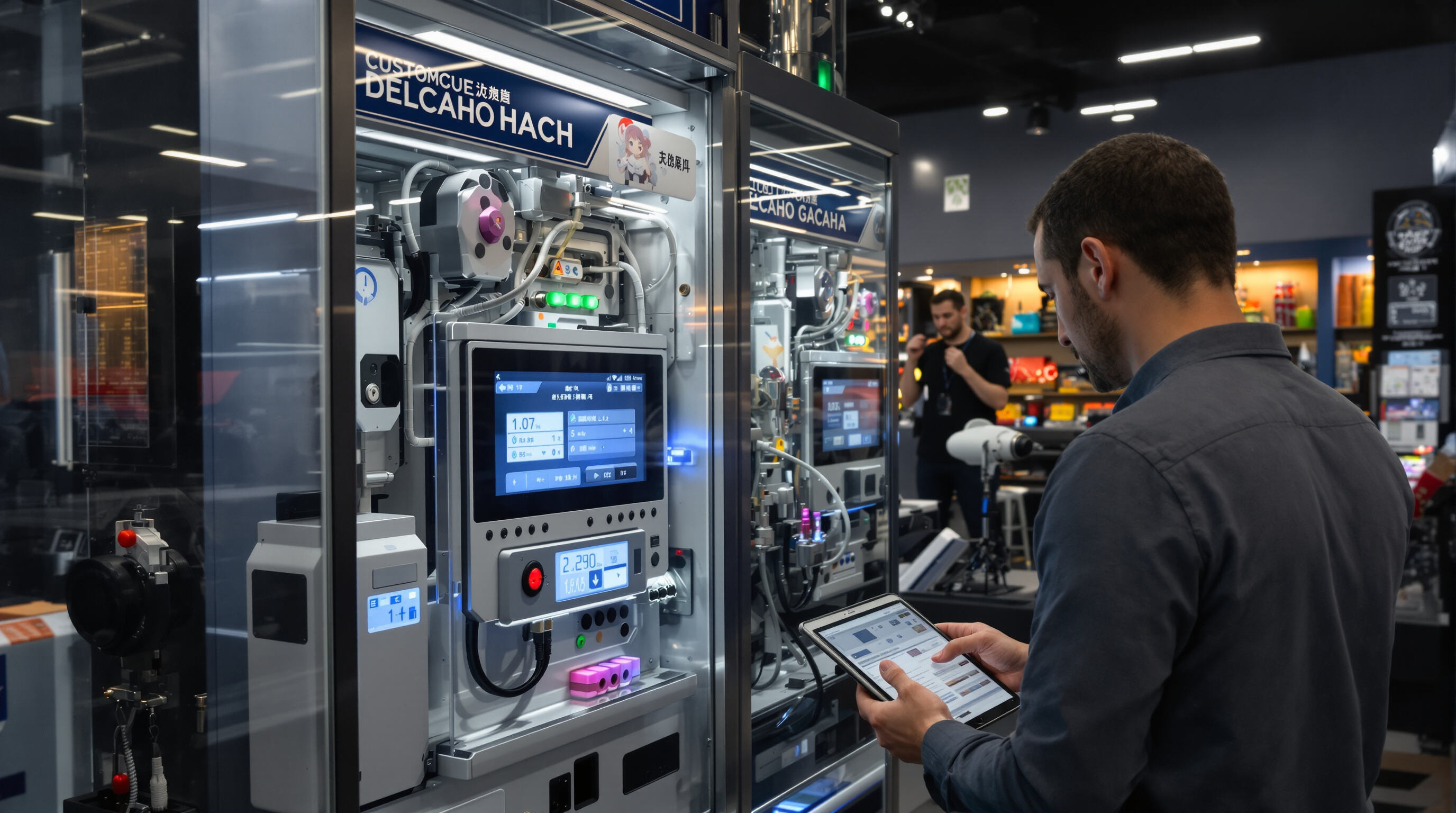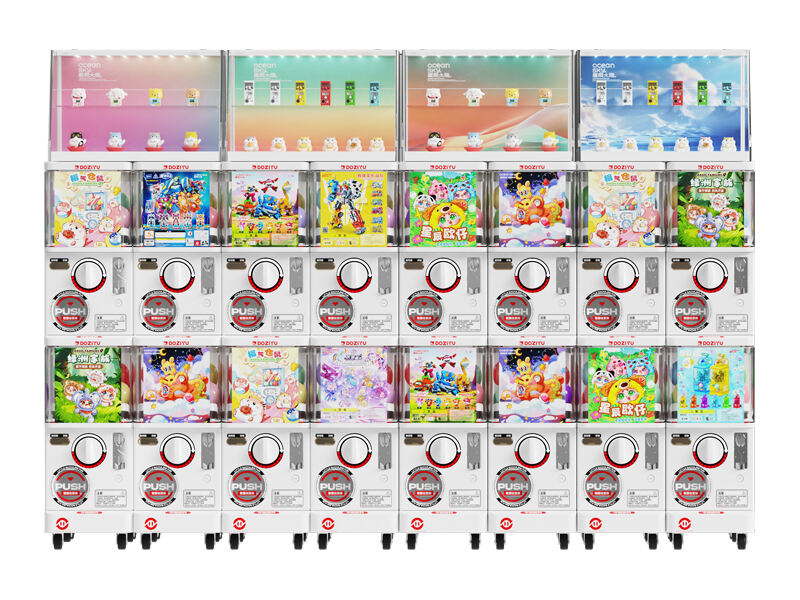The Evolution of Gashapon Machines: From Mechanical to Smart Custom Systems
From Mechanical to Smart: The Technological Shift in Gacha Machines
What started as basic mechanical dispensers has transformed into smart gashapon machines connected to the internet and cloud services. Back in the day, these machines had those old school crank mechanisms, but today's custom built gacha units come loaded with digital screens, artificial intelligence for tracking stock levels, and mobile app connections. According to industry insiders, companies using servo motors instead of traditional parts saw their breakdown rates drop by around two thirds last year according to the Vending Tech Report. The benefits? Operators can check on how well machines are running from anywhere, and customers get better experiences with vibrations when prizes drop and colorful lights guiding them through the process.
Key Innovations Driving Modern Gashapon Experiences
Three technological advancements are reshaping the industry:
- Touchscreen Consoles: 78% of users prefer machines with interactive previews of available capsules
- Hybrid Payment Systems: Contactless transactions now account for 54% of purchases in high-traffic areas
- Modular Design: Customizable exteriors allow brands to update machine themes in under 30 minutes
These innovations align with the growing demand for personalized vending experiences, particularly among Gen Z consumers who spend 42% more per transaction than other demographics.
Data Insight: Global Gacha Machine Market Growth (2020–2025)
| Metric | 2020 | 2025 (Projected) | Growth Rate |
|---|---|---|---|
| Market Value | $2.1B | $3.8B | 80% |
| Custom Machine Sales | 340K units | 610K units | 79% |
| IoT-Enabled Units | 12% | 68% | 467% |
The Asia-Pacific market leads this expansion with a 43% revenue share, driven by strategic partnerships between entertainment brands and smart vending operators. This growth underscores the sector's transition from novelty vending to data-driven retail ecosystems.
Smart Integration and IoT in Custom Made Gacha Machines

How IoT Enables Real-Time Inventory and User Analytics in Gacha Machine Custom Made Units
The Internet of Things has turned those custom gacha machines into smart devices thanks to built-in sensors that keep tabs on how many capsules are left inside, getting it right about 98 out of 100 times according to recent reports from 2024. When these connected machines notice their stock dropping under 15%, they send alerts straight to the operator's phone or computer screen, which cuts down on machine downtime by roughly forty percent over older versions that didn't have this feature. There's also some fancy software running behind the scenes that looks at how people interact with the machine throughout the day. It spots when most folks come around for their daily pull and which characters tend to sell best. All this information helps store owners decide what kind of capsules should go into the machine next time they restock.
RFID and NFC: Enhancing User Engagement in Custom Gacha Machines
The latest custom gacha machines now use RFID tags inside those little capsules to create personalized LED light displays whenever someone makes a purchase, which actually boosts repeat visits by about 28% according to Arcade Tech Journal from last year. Some models come with NFC capabilities too, letting players store their digital prizes right on their phones, so there's this cool connection between real world gaming and what happens on screen. When companies run promotions using these mixed reality machines, they tend to keep customers coming back around 52% more often than regular old gachas do. Makes sense really, since people love seeing their rewards both physically and digitally.
AI-Powered Personalization in Gashapon Machine Custom Made Platforms
AI-Driven Character Recommendations Based on User Behavior
Today's custom built gacha machines are getting pretty smart thanks to machine learning tech that looks at all sorts of player info. The system checks things like who plays when, what they buy, and how they interact with the game. These algorithms actually track around 15 different behavior clues including how long people play during each session and how often they redeem their capsules. According to Ponemon research from last year, this approach gets character suggestions right about 92% of the time for regular players. When tested in real world settings at entertainment spots across Japan, early versions saw a boost in player engagement of roughly 37%. What's interesting is that these new systems respond to requests nearly 60% quicker than older methods based on simple rules. Faster recommendations mean happier customers spending more time with the machines.
Dynamic Pricing and Limited-Time Offers in Gacha Machine Custom Made Platforms
Capsule machines are getting smarter thanks to AI that looks at local foot traffic, what characters are hot on social media right now, and how fast inventory moves. At last year's Tokyo Comic-Con, these dynamic pricing strategies actually brought in about 22 percent more money per machine compared to old school fixed pricing methods according to Statista reports. For limited edition drops, some companies even factor in weather forecasts and nearby events to trigger special deals. This approach worked wonders in shopping malls where sales went up around 41% when they implemented these timed promotions. The numbers tell a story about how responsive pricing can make all the difference in competitive markets.
Controversy Analysis: Balancing Gamification and Ethical Design
Personalized gaming experiences have been shown to increase operator profits somewhere between 18 and 34 percent according to McKinsey's latest report from last year. But there's growing concern among players too. A recent survey across ten different countries found that nearly half (about 43%) of respondents worried about what some are calling AI-powered "predatory engagement" tactics in those fancy custom gacha machines we see everywhere these days. The good news? When game systems actually show players their real time drop rates and set clear spending limits, people tend to be much happier with their experience. Satisfaction scores jump around 29 percentage points compared to games where everything remains hidden behind closed doors. As for the big companies making these machines, they're starting to build in mandatory rest periods after every ten consecutive plays. This change comes as regulators in Europe and parts of Southeast Asia get increasingly strict about how these games operate and protect younger audiences from potential exploitation.
Sustainability and Energy Efficiency in Next-Gen Custom Gashapon Machines
The gacha machine custom made market is undergoing an environmental revolution, with manufacturers reducing carbon footprints through material innovation and renewable energy integration. Industry leaders now prioritize biodegradable PLA plastics and recycled aluminum in machine construction, cutting material waste by 27% compared to 2020 designs (Global Vending Industry Report 2024).
Eco-Friendly Materials and Low-Power Components in Custom Gacha Builds
Newer models come equipped with LED screens that kick on only when someone moves nearby, using about half the electricity of old fashioned lighting setups. Around 35 to 40% of people running these machines have switched to modular builds lately, which means they can swap out parts instead of tossing everything when something breaks down. This change has helped equipment last anywhere from four to seven extra years in most cases. The good news keeps coming too since biodegradable capsules are breaking down roughly twelve times quicker than those standard plastic ones we used to see everywhere. This matters a lot for landfills, something experts highlighted back in their 2023 report on toys and environmental impact.
Solar-Powered Gashapon Units in Outdoor Installations
The latest outdoor equipment now comes equipped with those thin film solar panels that boast around 23% efficiency when it comes to converting sunlight into power. These machines can run for well over 18 hours straight even when there's no connection to the electrical grid. Some testing has been done in places like Tokyo and Singapore where these solar powered devices managed to stay operational about 92% of the time despite being partially shaded. That actually beats what we see from regular corded versions especially during those hot summer months when everyone else is struggling with their electricity bills. What makes these systems really work wonders though are these hybrid batteries inside them. They just switch back and forth between using whatever solar power is available and drawing from stored energy reserves. This means the machines keep running smoothly even through three whole days of cloudy weather or bad lighting conditions.
Themed and Limited-Edition Gacha Machine Custom Made Collaborations
Collaborations with Anime and Gaming Brands in 2024–2025
The custom made gacha machine industry has been jumping on themed partnership bandwagons lately to get customers excited about collecting. According to Global Toy News from 2024, around two thirds of operators actually see these limited edition anime and gaming collabs as their main money maker. Brands love this approach because it lets them roll out special capsule collections linked to big name franchises. We're talking about stuff like seasonal character versions or special edition figurines for specific events. Take a look at what's happening in the market right now – top manufacturers have started using real time license tracking tech so they can time machine placements perfectly with new media drops. Collectors basically get their hands on those coveted gashapon figures just days after an anime premieres or a new game comes out, sometimes even within 48 hours!
Case Study: Pokémon x Universal Studios Custom Gashapon Campaign
A 2025 collaboration between a global entertainment resort and a monster-collection franchise demonstrated the potential of hybrid experiential marketing. Custom-built gacha machines featuring weather-resistant touchscreens and multilingual interfaces were placed at high-traffic park locations, dispensing region-exclusive Pokémon figurines. The campaign achieved:
- 19% increase in per-guest spending near installations
- 34% rise in social media tagging vs. standard park attractions
- Zero overstock through RFID-enabled inventory matching
This model highlights how gacha machine custom made solutions can transform passive merchandising into interactive destination experiences while maintaining operational efficiency.
FAQ
What is a gashapon machine?
A gashapon machine is a type of vending machine that dispenses capsules containing toys or collectibles. Originally mechanical, these machines have evolved to incorporate smart technology.
How do smart gashapon machines work?
Smart gashapon machines feature digital screens, IoT sensors, and connectivity to mobile apps. They allow operators to manage stock levels remotely and offer interactive experiences to users.
What are the key innovations in modern gashapon machines?
Notable innovations include touchscreen consoles for interactive previews, hybrid payment systems for contactless transactions, and modular designs for brand customization.
Why are eco-friendly materials important in gashapon machines?
Eco-friendly materials minimize environmental impact by reducing carbon footprints and minimizing waste. Using biodegradable plastics and low-power components helps achieve sustainable outcomes.
How do collaborations with brands impact gashapon machines?
Collaborations enable limited edition collections linked to media franchises, increasing consumer excitement and sales. They also offer opportunities for themed merchandising strategies.
Table of Contents
- The Evolution of Gashapon Machines: From Mechanical to Smart Custom Systems
- Smart Integration and IoT in Custom Made Gacha Machines
- AI-Powered Personalization in Gashapon Machine Custom Made Platforms
- Sustainability and Energy Efficiency in Next-Gen Custom Gashapon Machines
- Themed and Limited-Edition Gacha Machine Custom Made Collaborations
- FAQ

 EN
EN
 AR
AR DA
DA NL
NL FI
FI FR
FR DE
DE EL
EL HI
HI IT
IT JA
JA KO
KO NO
NO PL
PL PT
PT RU
RU ES
ES SV
SV TL
TL IW
IW ID
ID VI
VI HU
HU TH
TH TR
TR MS
MS GA
GA LO
LO MY
MY